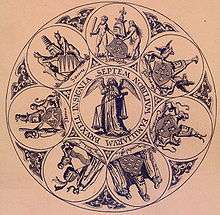Seven Noble Houses of Brussels
The Seven noble houses of Brussels (French: 7 lignages de Bruxelles, Dutch: 7 geslachten van Brussel) were the seven families of Brussels whose descendants formed the patrician class of that city, and to whom special privileges in the government of that city were granted until the end of the Ancien Régime.
History

The seven families were first named in a document (from the year 1306) in which John II, Duke of Brabant restores and asserts the existing privileges of the seven families after the citizens of Brussels had violently demanded participation in the city's government. The families named in the document are
- Sleeus
- Sweerts
- Serhuyghs
- Steenweeghs
- Coudenbergh
- Serroelofs
- Roodenbeke
All the members of the city council were exclusively recruited and elected from among those families who could prove patrilinear or matrilinear descent from the original seven families. Although tradesmen formed the guilds of Brussels to counter this oligarchical system and in 1421 after violent confrontations gained some rights to participate in the city's government, the rule of the seven houses remained predominant until the end of the Ancien Régime, when these special privileges were abolished. This meant the end of the oligarchical system of the seven noble houses of Brussels.
Membership
Membership and descent of the seven families was carefully recorded in special registers. Applicants needed to provide genealogical evidence that they were descendants of one of the seven noble houses of Brussels. In addition they needed to be citizens of Brussels, adult, male, catholic, and not earn a living through a trade; instead they were expected to live off the interest of their wealth. Illegitimate children were excluded. Since these criteria were very stringent, few men were accepted to the ranks of this particular patrician class.

Present day
Today some descendants of the families have formed L'Association des Descendants des Lignages de Bruxelles (French for "The Association of Descendants of the Lineages of Brussels"). The Association organizes certain traditional events such as the "Ommegang" ceremony. Descendants of the seven noble families do not enjoy special political privileges any longer.
Descendants of the seven nobles house of Brussels are entitled to place the post-nominal initials PB (Patricius Bruxellensis) or - in case he holds a title of nobility - NBP (Nobilis Patricius Bruxellensis) behind his name. This was a custom that is already found in the writings of Jan-Baptist Hauwaert, NPB (1533–1599).
Bibliography
- Joseph de Roovere, NPB, Le manuscrit de Roovere conservé au Fonds Général du Cabinet des Manuscrits de la Bibliothèque Royale de Belgique. Filiations reconnues sous l'Ancien Régime pour l'admission aux Lignages de Bruxelles, ed. M. Paternostre de La Mairieu, avec une introduction d'Henri-Charles van Parys, Grandmetz, 2 vol., 1981-1982 (Tablettes du Brabant, Recueils X et XI).
- N. J. Stevens, Recueil généalogique de la famille de Cock, Brussels, 1855.
- Vicomte Terlinden, Coup d'oeil sur l'histoire des lignages de Bruxelles, in, "Présence du passé", tome II, 1949.
- Baudouin Walckiers, PB, Filiations lignagères contemporaines, Brussels, 1999.
See also
External links
| Wikimedia Commons has media related to Seven Noble Houses of Brussels. |